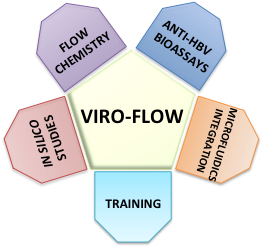VIRO-FLOW project
This ITN (Enabling Technologies and Drug Discovery: Continuous Flow Processes to Discover Novel Antiviral Inhibitors) will educate the next generation of well-prepared ESRs, providing them with the skills necessary to pursue successful careers in a rapidly emerging field that requires novel multidisciplinary technological development as well as it will also be the channel for educating well-trained researchers with the scientific, technical and entrepreneurial skills so highly needed in the drug discovery field. This goal will be achieved through industrial doctoral training that includes international, interdisciplinary and inter-sectorial mobility, and that integrates both academic and industrial contributions. The research programme is composed of three closely related projects in the research areas of medicinal chemistry (including organic and computational chemistry), molecular biology and protein biochemistry.

Research objectives
- Development of new synthesis methodologies in continuous flow for the fast, safe and efficient synthesis of new HBV inhibitors.
- Generation of diverse compound libraries focused on HBV targets by flow chemistry processes.
- Optimization and development of biochemical assays for identifying small molecules acting as HBV inhibitors.
- Transfer of the optimized bioassays to a microfluidic system and validation of the approach.
- Integration of both processes as “synthesis and test” of HBV inhibitors.
- Identification of lead compounds using computational approaches, including docking, scaffold hopping and generation of quantitative structure–property relationship (QSPR) models.
Training objectives
- To provide excellent scientific skills and knowledge in the area of drug discovery.
- To be multidisciplinary: each ESR masters more than one scientific discipline, while having a good understanding of related disciplines allowing the ESRs to excel in multidisciplinary teams/projects.
- To provide an in-depth view of the drug discovery and development process as a whole, including IP, regulatory, supply chain and business aspects, as well as a comprehensive view of the life sciences environment.
- To foster critical thinking, communication, leadership and entrepreneurship, among other transferrable skills that will not only increase the ESRs employability but also their success in their careers.
- To ensure that at the end of the project the ESRs obtain a PhD title. For instance, given the confidentiality constraints in the project, specific activities have been included to ensure the ESRs meet the publication requirements to submit their thesis.